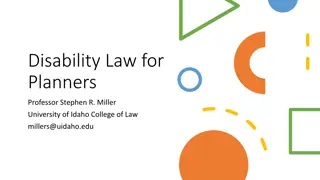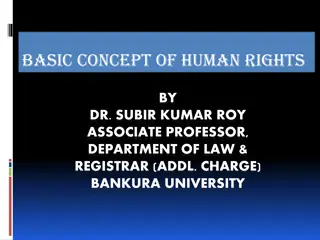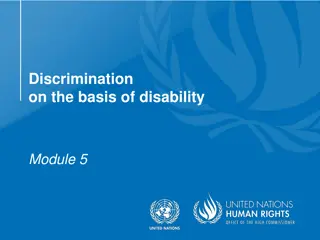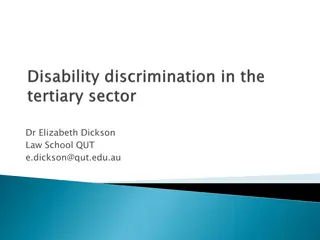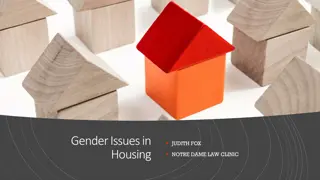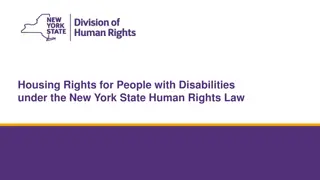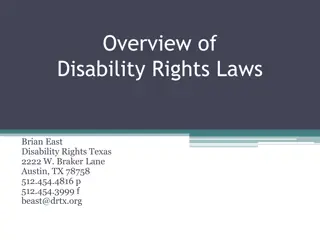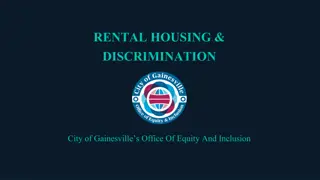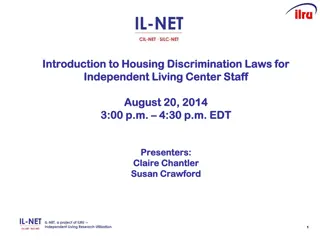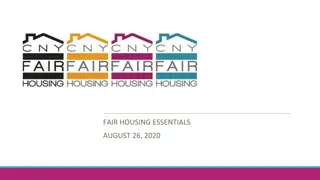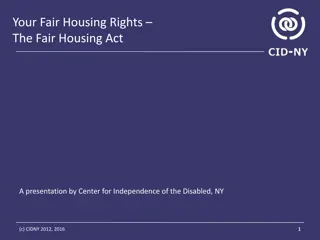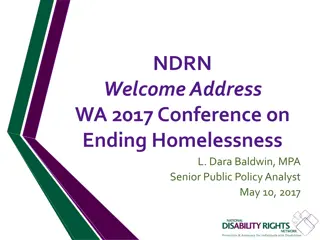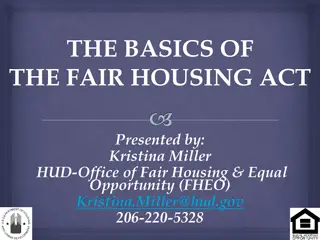Housing Discrimination Based on Disability under NY State Human Rights Law
This presentation by John P. Herrion covers the provisions of the New York State Human Rights Law (NYSHRL) that protect individuals with disabilities from housing discrimination. It discusses the types of housing discrimination prohibited under the NYSHRL, requirements for reasonable accommodations, and the enforcement by the NYS Division of Human Rights. The content also outlines covered housing providers, protected classes for housing, newer protections in housing, and the definitions of disability under NYSHRL and the FHA.
Download Presentation

Please find below an Image/Link to download the presentation.
The content on the website is provided AS IS for your information and personal use only. It may not be sold, licensed, or shared on other websites without obtaining consent from the author.If you encounter any issues during the download, it is possible that the publisher has removed the file from their server.
You are allowed to download the files provided on this website for personal or commercial use, subject to the condition that they are used lawfully. All files are the property of their respective owners.
The content on the website is provided AS IS for your information and personal use only. It may not be sold, licensed, or shared on other websites without obtaining consent from the author.
E N D
Presentation Transcript
1 Housing Discrimination based on Disability under the New York State Human Rights Law By: John P. Herrion Director of Disability Rights
2 What will we cover today? The NYS Human Rights Law (NYSHRL) provisions that protect persons with disabilities from housing discrimination. Types of Housing Discrimination Prohibited under the NYSHRL. Requirements for Reasonable Accommodations. NYS Division of Human Rights (DHR) enforcement of the NYSHRL.
3 Housing The New York State Human Rights Law covers both private and public housing, including rentals, cooperatives and condominiums.
4 Covered Housing Providers Owners Private or publicly-assisted Lessees or sub-lessees Rentals Managing agents Co-ops and condos Real estate brokers or agents sales of single-family homes, commercial space, etc. Other persons having the right to sell, rent or lease a housing accommodation Any agent or employee of the above
5 Protected Classes for Housing Sexual Orientation Race Disability, Including Reasonable Accommodation Color National Origin Familial Status Creed/Religion Marital Status Sex Sexual Harassment & Pregnancy Military Status Age
6 New(er) Protections in Housing Gender Identity or Expression Lawful Source of Income Prior Arrest Records, Sealed Records, Youthful Offender Status, and Adjournments in Contemplation of Dismissal Immigration Status
7 Definition of Disability under NYSHRL physical, mental or medical impairment resulting from anatomical, physiological, genetic or neurological conditions which prevents the exercise of a normal bodily function or is demonstrable by medically accepted clinical or laboratory diagnostic technique, or; a record of such an impairment, or; a condition regarded by others as such an impairment.
8 Definition of Disability under FHA The FHA defines disability as a substantial limitation of a major life activity. The definition of disability under the NYSHRL is more broadly construed and does not require the impairment to be substantial or affect a major life activity.
9 Housing Prohibited Discriminatory Conduct Housing providers may not refuse to sell or rent housing accommodations on account of a person s disability. Housing providers can not discriminate in the terms, conditions or privileges in the sale, lease or ownership of a housing accommodation on account of a person s disability. Housing providers are prohibited from printing, circulating, advertising or using any form of application, or making any record or inquiry that expresses directly or indirectly any limitation, specification or discrimination as to disability.
10 Housing Reasonable Modifications Housing providers must permit, at the expense of a person with a disability, for reasonable modifications of existing premises occupied or to be occupied by such person if the modifications may be necessary for full enjoyment of the premises.
11 Housing Reasonable Modifications 1 Examples of reasonable modifications include: widening of doorways; adjusting kitchen / bath fixtures or counter heights; installation of grab bars.
12 Common Areas Housing providers are required to pay for reasonable modifications in common areas.
13 Reasonable Accommodations Examples of reasonable accommodations to rules, policies, practices or services include: installation of a ramp in a common area; waiving a no pet policy for a person with a disability who needs an emotional support animal; moving a person with a disability to the top of a waiting list to secure a handicap parking space that is close to, and on an accessible route to one s unit.
14 Reasonable Accommodation Notice In 2022 a law was passed requiring notice be provided to tenants and prospective tenants of their right to request reasonable accommodations for a disability.
15 New Construction Newly constructed covered multi-family dwellings must be designed and constructed in accordance with the accessibility requirements found in the New York State Uniform Fire Prevention and Building Code. Newly constructed multi-family dwellings include those built for first occupancy after March 13, 1991. Multi-family dwellings are defined as, a dwelling which is occupied for permanent residence, and which is either sold, rented, or leased to be occupied as the residence of three or more families living independently of each other.
16 New Construction 1 Requirements Include: Public use and common use portions of the dwellings are readily accessible to and usable by persons with disabilities; All doors are designed to allow passage into and within all premises and are sufficiently wide to allow passage by persons in wheelchairs; All premises within the units contain an accessible route into and through the dwelling;
17 New Construction 2 Requirements Include: Light switches, electrical outlets, thermostats, and other environmental controls are in accessible locations; and Reinforcements in the bathroom walls to allow later installation of grab bars;
18 Guide, Hearing & Service Dogs Persons with disabilities that use guide, hearing or service dogs that have been professionally trained have significant protections under the NYSHRL to have the dog go where they go.
19 G/H/S Dogs & Emotional Support Animals - Housing Persons who use G/H/S dogs that are professionally trained are protected to have their dogs live with them. Emotional support animals and assistance animals not professionally trained are subject to a reasonable accommodation analysis.
20 Emotional Support Animals - Housing Persons with disabilities that have a disability related need for an emotional support animal can ask a landlord to waive a no pet policy to allow for an emotional support animal to live with the individual. Landlord is entitled to medical documentation to support that the person has a disability and that the need for the animal is disability related.
21 Emotional Support Animals Housing 1 Landlords are prohibited from making restrictions on the type of animal, breed or size of dog, and from assessing fees for someone who needs an emotional support animal because of their disability.
22 DHR Complaint Statistics While employment cases make up the majority of discrimination complaints filed with DHR, housing complaints are the second most. 55% of housing complaints filed with DHR include allegations of discrimination based on disability.
23 DHR Complaint Statistics 1 Majority of disability/housing complaints allege refusal to reasonably accommodate.
24 Housing Complaint Process Investigation Determinations: Probable Cause vs. No Probable Cause Public Hearing or State Court After Public Hearing: The Commissioner s Final Order
25 Remedies - Housing If the Commissioner finds that discrimination has occurred, remedies may include: Making the housing at issue available; Making reasonable accommodations and/or modifications to housing or housing policies; Compensation for mental anguish; Compensation of out-of-pocket expenses;
26 Remedies Housing 1 Punitive damages (housing and credit only); Civil fines up to $100,000; Requiring the housing provider and staff to attend anti- discrimination training; An order to cease the discriminatory actions or policies; Attorney s fees.
27 Contact Info If you d like connect with the Division with questions or requests, call us at 1-888-392-3644 or email us at info@dhr.ny.gov. DHR s Director of Disability Rights, John Herrion, can be contacted at john.herrion@dhr.ny.gov, or 718-741-8332.
28 Questions/Contact us Call Email Visit Follow Email us at info@dhr.ny.gov Visit dhr.ny.gov Follow @NYSHumanRights on YouTube, Twitter, Facebook, Instagram, & LinkedIn Call DHR at 1-888-392-3644


